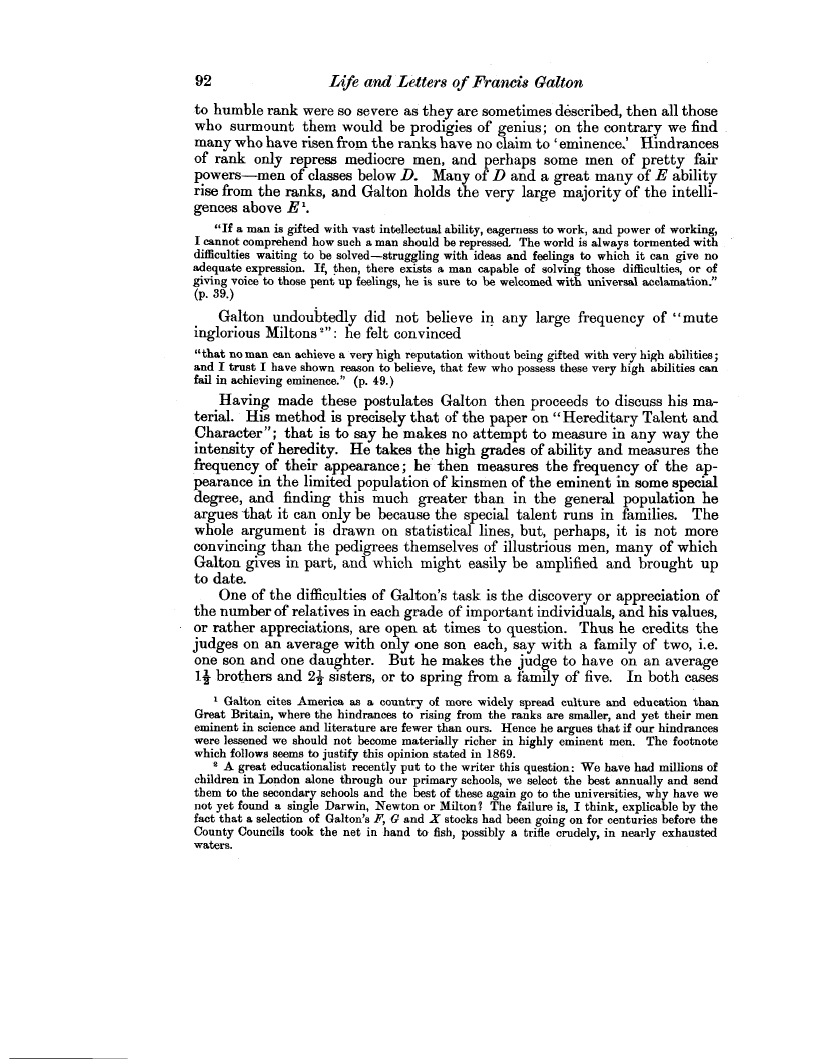92 Life and Letters of Francis Galton
to humble rank were so severe as they are sometimes described, then all those who surmount them would be prodigies of genius; on the contrary we find many who have risen from the ranks have no claim to `eminence.' Hindrances of rank only repress mediocre men, and perhaps some men of pretty fair powers-men of classes below D. Many of D and a great many of E ability rise from the ranks, and Galton holds the very large majority of the intelli
gences above E 1.
"If a man is gifted with vast intellectual ability, eagerness to work, and power of working, I cannot comprehend how such a man should be repressed. The world is always tormented with difficulties waiting to be solved-struggling with ideas and feelings to which it can give no
adequate expression. If, then, there exists a man capable of solving those difficulties, or of giving voice to those pent up feelings, he is sure to be welcomed with universal acclamation." (p. 39.)
Galton undoubtedly did not believe in any large frequency of "mute
inglorious Miltons 2" : he felt convinced
"that no man can achieve a very high reputation without being gifted with very high abilities; and I trust I have shown reason to believe, that few who possess these very high abilities can fail in achieving eminence." (p. 49.)
Having made these postulates Galton then proceeds to discuss his material. His method is precisely that of the paper on "Hereditary Talent and Character"; that is to say he makes no attempt to measure in any way the intensity of heredity. He takes the high grades of ability and measures the frequency of their appearance; he' then measures the frequency of the appearance in the limited population of kinsmen of the eminent in some special degree, and finding this much greater than in the general population he argues -that it can only be because the special talent runs in families. The whole argument is drawn on statistical lines, but, perhaps, it is not more convincing than the pedigrees themselves of illustrious men, many of which Galton gives in part, and which might easily be amplified and brought up to date.
One of the difficulties of Galton's task is the discovery or appreciation of the number of relatives in each grade of important individuals, and his values, or rather appreciations, are open at times to question. Thus he credits the judges on an average with only one son each, say with a family of two, i.e. one son and one daughter. But he makes the judge to have on an average 1- brothers and 21 sisters, or to spring from a family of five. In both cases
1 Galton cites America as a country of more widely spread culture and education than Great Britain, where the hindrances to rising from the ranks are smaller, and yet their men eminent in science and literature are fewer than ours. Hence he argues that if our hindrances
were lessened we should not become materially richer in highly eminent men. The footnote which follows seems to justify this opinion stated in 1869.
s A great educationalist recently put to the writer this question: We have had millions of children in London alone through our primary schools, we select the best annually and send them to the secondary schools and the best of these again go to the universities, why have we not yet found a single Darwin, Newton or Milton? The failure is, I think, explicable by the fact that a selection of Galton's F, G and I stocks had been going on for centuries before the County Councils took the net in hand to fish, possibly a trifle crudely, in nearly exhausted waters.

